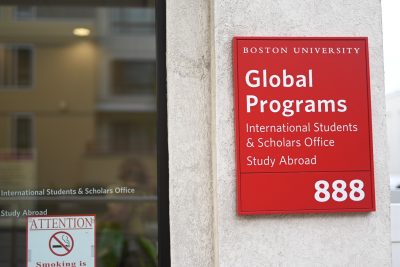
Boston University President Robert Brown sent a letter to federal leaders on behalf of BU Oct. 23 to push back against a Department of Homeland Security proposal that could limit how long international students may study in the United States.
The proposal limits F- and J-visa recipients’ stay to a maximum of four years in the country — depending on their program — while also requiring they apply for an extension of their stay in the country if they are looking for a job.
The current system allows students to stay in the U.S. under a “Duration of Status” policy, which grants them the right to remain in the country until their studies are complete.
In the letter, Brown argued the proposal would cause stress on international students by imposing a new degree of uncertainty on their visa statuses, as well as obstruct “American innovation” and harm the U.S. economy.
“We must ensure that the United States continues to welcome the best and brightest international students and scholars,” Brown wrote, “who are vital to our communities, our leadership in higher education and research, and our country’s economy and global competitiveness.”
BU spokesperson Colin Riley said the University will comply with any government orders, even if it expresses opposition.
“We respect the laws that are enacted and we work with the agencies as required,” Riley said. “Of course we always advocate on behalf of our students.”
Riley said BU’s Global Programs, which oversees the International Students and Scholars Office, works to help the University’s international students navigate regulatory and legal requirements.
BU has been reaching out to its students via WeChat and Sina Weibo — social media platforms popular among students hailing from China — to make them aware of the University’s support for them.
The proposed limit on the duration of students’ stay hinders their ability to learn in the U.S. by holding them to a different standard than American students, Global Programs wrote in an email.
“Admission for duration of status allows students the ability to progress in their academic careers, through different levels of education,” the email states, “and the proposed rule would greatly inhibit this ability.”
International students should stay in touch with ISSO as the situation develops, according to the Global Programs email.
College of Communication senior Maura Munaf said the proposal puts international students like herself in a tough spot, because she wouldn’t know whether or when she might have to return to her home country of Indonesia.
“I thought that it was unfair and it was kind of stressful as well, because I’m also in the process of job applications,” Munaf said. “Everything is so contingent to what laws are going to change that regulate how we’re going to be able to work in the U.S.”
Munaf said it’s not surprising BU is pushing back against the proposal, because she notices the school values its international community.
“I’ve been always in touch with the ISSO and they’re always so helpful with any processes,” Munaf said. “They’re a really good group of people and they’re really supportive of us.”
Amanda Marki, a junior in the College of Fine Arts and international student, said she would not be surprised if the proposal passes and becomes official federal policy.
“In all honesty, I don’t expect much from this country at this point,” Marki said. “I’ve started considering packing to-go bags and stuff like that just in case, worst-case scenario, I need to flee the country.”
Marki said she, like Brown, believes international students benefit the American workforce when they remain in the states.
“If we are coming into this country and putting money into this country, we should have a right to stay,” Marki said. “I don’t quite understand what motives they would have aside from blatantly racist ones.”























































































































